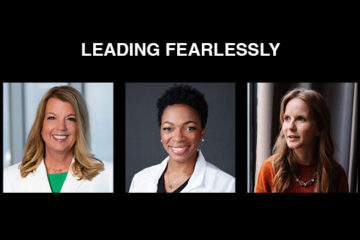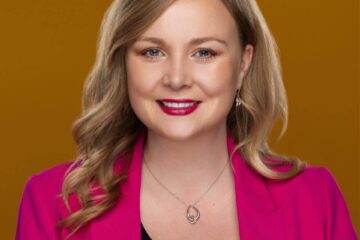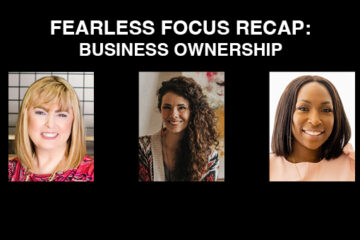How Sara Kurovski, Pleasant Hill’s first woman mayor, led her city through a devastating tornado
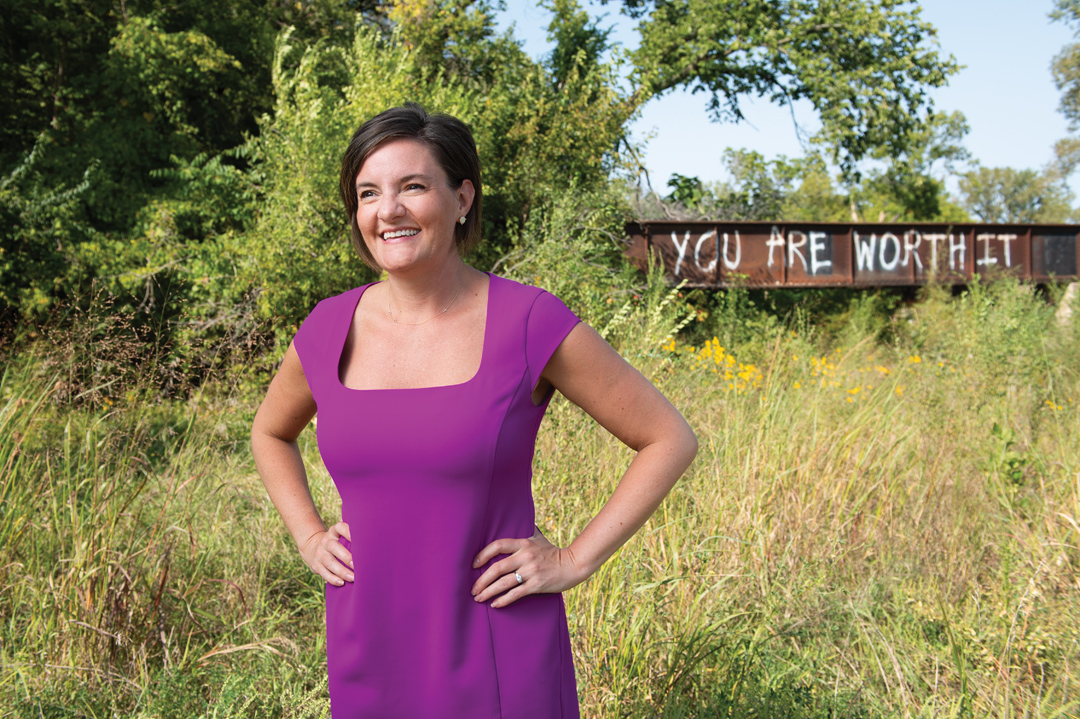
As told to Nicole Grundmeier
Sara Kurovski is the mayor of Pleasant Hill. She is also the president and CEO of Make-A-Wish Iowa. On April 26, 2024, an EF-2 tornado tore through her Des Moines suburb of more than 10,000 residents. Kurovski had learned an important leadership lesson from previous emergencies: In those first critical moments, you have to sit back and wait while your team does its job. In the following days, she fielded phone calls from traumatized residents, including moms who wanted to check on the graves of their children at the city’s cemetery.
Kurovski’s steady presence enabled the city to move forward together. But the tornado was not Kurovski’s first time facing fear head-on: She was just 29 years old when she became Pleasant Hill’s first woman mayor. She considers her decision to run for mayor as her biggest fearless moment.
Kurovski is a Lincoln High School/Des Moines Public Schools graduate. She received a bachelor’s degree in communications from Truman State University in Kirksville, Mo., and her master’s degree in public administration from Drake University. Her first job out of college was with Metro Waste Authority, which quietly put her on the road to becoming Pleasant Hill’s mayor.
The following story has been formatted to be entirely in her words, and has been edited and condensed for clarity.
I joke that I know way too much about garbage. I had never thought about local government until my time at Metro Waste Authority.
Tom Hadden at Metro Waste Authority was very supportive: “You should get involved in your community.” He encouraged me to reach out to some of the community leaders here, talk to them and find a way to participate. I literally brought my resume up to City Hall and said, “Hi, I live here. I would love to participate in some way. I don’t know what that means. But here’s who I am.” Having a young female show up and say, “Hi, how can I be helpful?” was intriguing to both some of the elected officials at that time and staff members, and I got invited to participate in some smaller committees in the city and ended up applying and landing on the board of adjustment.
I had no idea what it meant to be on the board of adjustment. I had no idea what I needed to learn. But I thought, “Well, if they’re asking me to do this, they must see something that I bring to the table,” and I didn’t know at that time what that was. It was a great learning opportunity and a great time for growth and to ask the questions, especially on tricky topics. I moved on from board of adjustment to plan and zoning.
Mike Richardson, who was the mayor at that time, said, “We should have a conversation,” and I thought, “Oh gosh, what did I say at P&Z that he’s unhappy?” That’s the first thing that comes to your mind when the mayor’s like, “We should talk.” I went and met with him and a few others and he said, “I’m not running for mayor again, and I want you to run.” I said, “I’m not qualified.” And he said the most shocking statement that, at that point in my career, anyone had said to me. He said, “You have your master’s in public administration, and I have my GED.”
I did say, “No, I have two small kids at home, I can’t run,” and he said, “Please think about it.” That’s when I was reading “Lean In” by Sheryl Sandberg. I decided, “OK, I’m not going to sit back and do this to myself, and I’m going to run, and I don’t know what I’m doing, but I’m going to run, because I don’t want to say no, because I think I’m not qualified.” That I can learn. That’s scary, and I think that, for me, is my personal, largest fearless moment. Because I had no idea how to run a campaign.
I did not know a majority of the people in this community. We were in the middle of a controversial economic development project. I had two small children at home. I just thought, “I don’t know what I’m doing. But I feel like this is a door that’s opening. And if I don’t walk through this right now, I might not ever get that opportunity again.”
It was an incredible learning moment. Without having taken that first, really scary, hard step, I don’t think I would have been able to do all these other things that have come along the way that are equally scary, but I could recognize in myself: “This is a hard moment. We can get through this.”
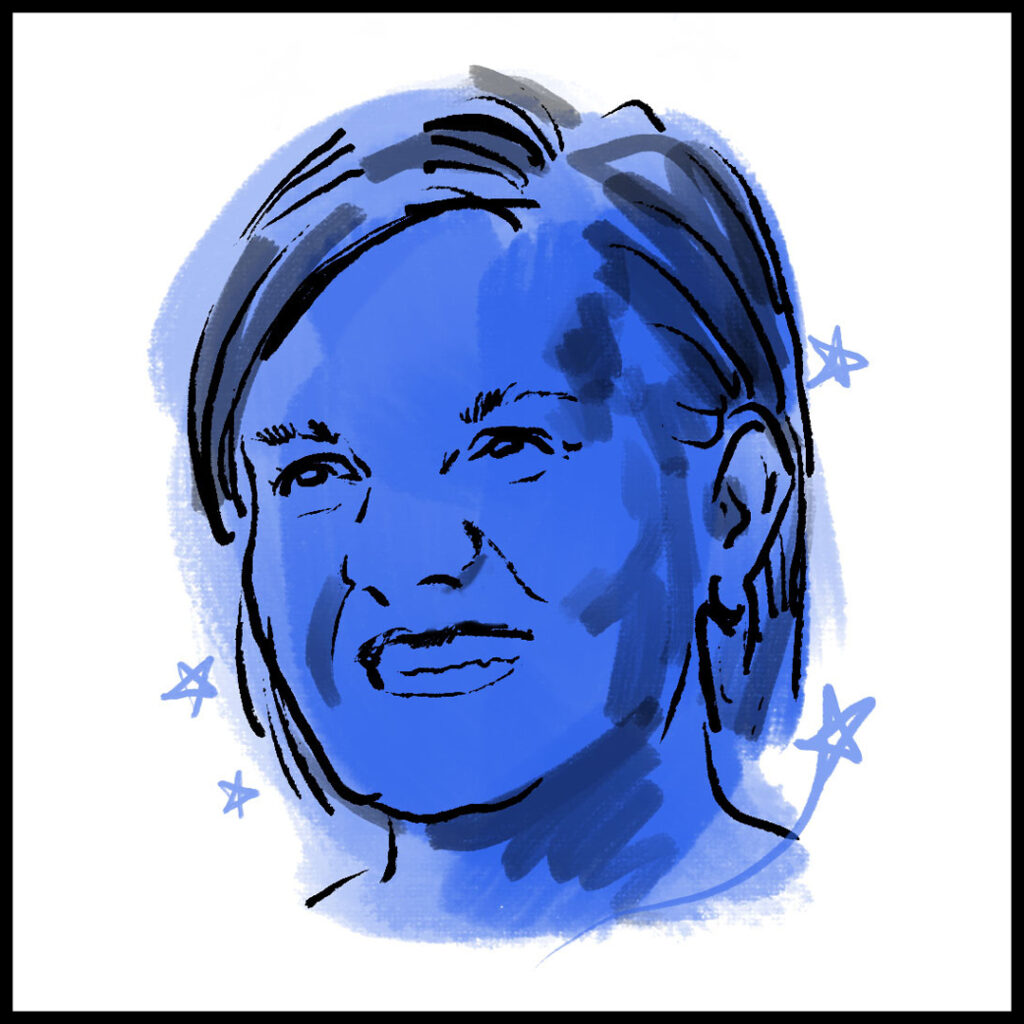
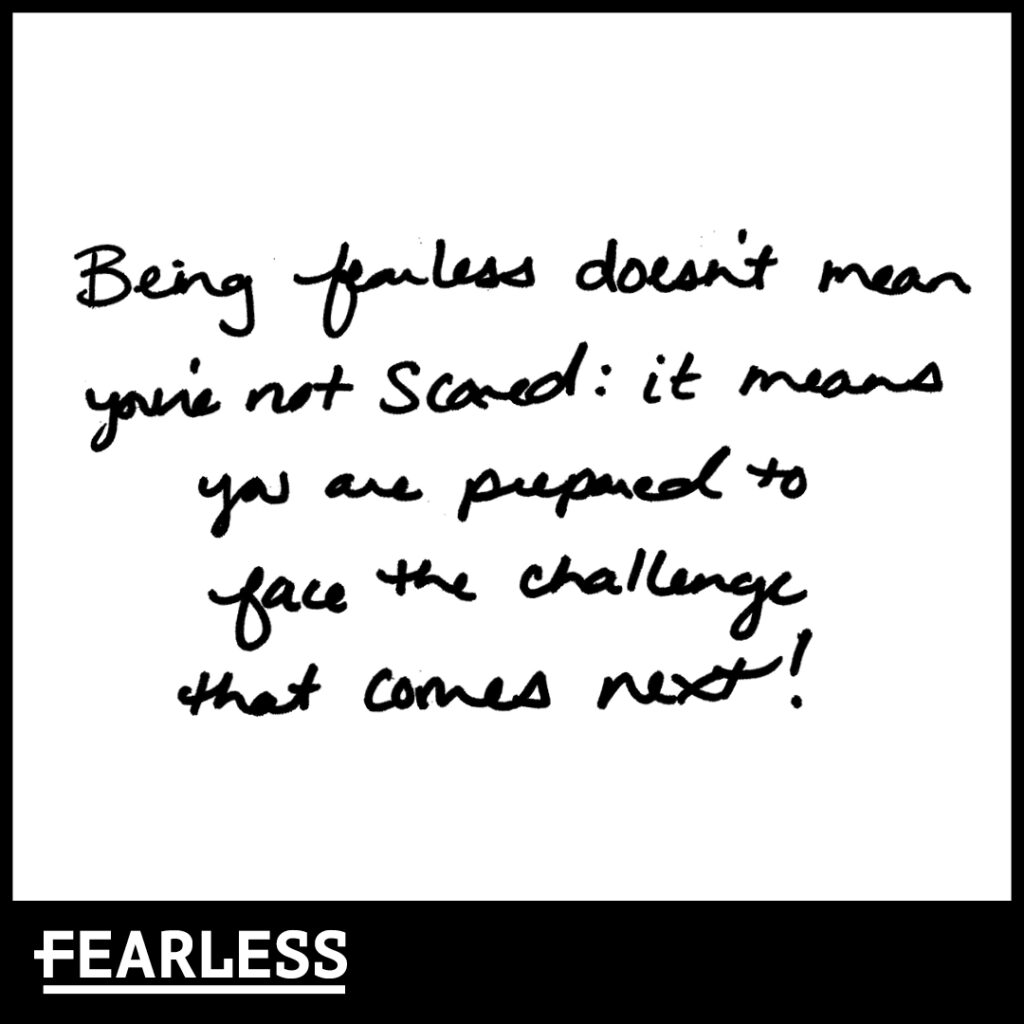
My family’s not political. Neither is my husband’s family. Looking back, my first campaign for mayor is one of the truest local campaigns, in terms of not being the way a campaign is run today. So much has changed in the world of politics since that time. But it was so simple. I didn’t have data. I was trying to raise money and I didn’t know how to do that. I was calling the state office where you register and report all your financials probably once every other day, making sure I was doing something right.
I just asked everybody, “What do you want me to know? What are you worried about for the city? Who should I talk to next? And who can you connect me with? Can you help me by making a donation?” I just kept asking and kept asking, but I also, in a sense, was very naive.
When people have asked me now, “Would you run again, knowing what you know today?” I don’t think I would have. There’s so much that happens for anyone who runs for office and so much that, honestly, never gets talked about that it would be overwhelming for anyone to run. But I’m so glad I did. And I’m so glad I was as naive as I was, because I think part of that was it gave me the energy to go, “OK, what’s the problem? How do we get information? How do we tackle that?”
I was very worried about being young and being a woman. What would I run into? But right away, there was a group of older men in the community that wholly embraced me. They sat me down just like they would any other candidate, asked me questions. I told them what I knew, I told them what I didn’t know and how I would learn, and they were my greatest champions.
It is really sad because some of them have passed away since, but I remember telling my husband after the first meeting with them, “This was what I was so worried about, and they’re all in,” and they were wanting young, new, fresh energy to help lead the city. It was just very surprising right out of the chute. And of course, there are the other elements that did pop up. But for me, because I had such a strong group of diverse residents in the community, in gender and age, that stood up for me right away and said, “Yes, we want to elect her,” that overshadowed some of the other more negative conversations or incidents, and it did take me a while to find my voice when those things were happening.
I have tried since then to always talk with women when they’re campaigning, to share some of those awkward conversations and how to approach them, because it can be very intimidating. Now, I fully leverage the blunt voice that I can have when those instances occur. They sometimes seem so small, but they’re unacceptable. We, as a society, should be past that, but we’re not.
I think the greatest challenge was changing the entire culture of how we operate as a city. That was really evident when I was door-knocking and campaigning — that people wanted the city to not be this sleepy city anymore. This is not about anyone who was in office prior; they just made different decisions. The city was growing, getting more younger families, and they wanted the city to change and have services and have really professional, highly educated staff to make sound decisions. What it would take to move us collectively forward, I had no idea how to do that. It was one little piece at a time and understanding where we had gaps in either staffing or education.
Being contiguous to Des Moines, you have all the big-city problems as a small city. We’re not on an island 50 miles south; we are right here on the river. Crime doesn’t see city boundaries. With a highway and a bypass, it’s very complicated for such a small city. To go department by department, it took a lot of time, and I’m so proud of where we have come just from the professional staff we have, how we activate, how we’re planning with our elected officials for the future of the city. We get the responses and requests from the residents, and that really didn’t exist when I started. That has helped us manage so many of these very scary and frightening situations that have occurred.
I was only a year and a half in when we had a public shooting. That was really my first incident as a mayor where I had no idea what to do and was dependent upon the staff to lead, educate and guide me. I learned a lot through that incident in partnership with the school because there were threats being made at the school. You want to talk about scary; I didn’t sleep at all that week, and I had nightmares of the most horrific outcomes possible. You never think about that weighing on you when you are in charge.
When I thought I would be working on potholes and economic development, and you’re suddenly dealing with a public shooter who was caught very quickly but there were bomb threats at the school district — there’s a big learning curve. It has continued to evolve every step of the way, from elevating the culture, which has allowed us to do the economic development that citizens have asked for, professionalizing staff to be responsive and engaging with residents and to really driving this vision forward of building a great community. That doesn’t happen overnight. If I was done tomorrow, I would be so proud of everything we’ve accomplished here. But it has been because we all said, collectively, staff and elected officials, this is where we want to go, and we’re going to do it together.
Being a mayor is very unique during crisis response. First and foremost, you want your team to do their job. You can’t get information as a mayor or a council member until your staff has done their job. I think the hardest part during a crisis is waiting for them to confirm the information with you.
My brother-in-law lives in Omaha. On our family group chat on April 26 this year, he was sending the pictures of the tornado that was about a mile and a half from his house. I very distinctly remember looking at those because he had said, “It’s moving into Iowa right at you guys.” And I told my husband, “I don’t like how I feel about this. I’m really worried about tonight. I hope this is just an overreaction.” The kids had soccer. I went with a friend to get pedicures that night, because it was just a lot of waiting.
It didn’t hit until about 8:30 that evening. I was driving back, I got to the house, we had the weather on, and I said to the boys, “OK, they’re telling us it’s going to hit Pleasant Hill. We need to go to the basement,” and our power went off. Then it’s that moment of mama bear kicking in and going, “Get in the basement now.” We went to the basement, we’re waiting for the all clear, you could hear the sirens. All the text messages coming in: “Are you guys OK?” “No, I got hit,” and then somebody else saying, “I hear on police scanners there’s a gas leak.”
For myself, I’m just sitting there, waiting for the call from our team here. They’re responding. And it’s my job not to bother them. Those first hours are so important. I don’t think people understand that: The elected officials have to stay out of the way. We have to be ready to make the calls or get the things we need for the staff as requested. But that is the hardest part, until you are told “here’s what happened, here’s what needs to happen next, here’s what I need from you.” It’s the hardest part.
Polk County Emergency Management activated the call for that evening — and this is also why it’s so important to have so many great council members. We are a team. I could not work with no power and the internet being down. But I got a text from Len Murray, who’s on our council. He was able to call in, so he was receiving the information, able to relay it to our team. Then we were having that alarm that the next one was coming through.
Thankfully, nothing else happened, just some high wind, more rain. It’s a lot of “hurry and wait.” I jumped up very early the next morning, had the phone by me all night, but I just had to wait, because everybody was doing their jobs. It’s really that first eight to 12 hours after where there is a key plan and strategy where we have our Polk County Emergency Management calls, we activate on the things we need to activate on, like my emergency proclamation, beginning to draft that, what’s needed, who do I need to call and also managing the information. What are we getting out to residents? How are we getting it out? Because, again, people don’t have electricity or internet. How would they read anything online? Who’s going door to door and who’s sharing what information?
It’s a lot in that first day, but I really do credit having been through two floods, a derecho, a minor tornado on the edge of the city and the public shooting to understand truly what my role was in that moment. Those first few disasters, I was absolutely in the way: “What do you need? How can I help?” I’m sure it’s hard for staff in every city to tell their elected officials, because they’re their bosses, to stay out of the way or wait for me to communicate to you.
That night when I was watching the tornado’s path, I was very nervous. Formerly Magellan pipeline — it’s called Oneok now — it’s the fuel farm here in Pleasant Hill, and most people don’t know that almost all the fuel in Iowa is deployed from this location. I was watching the path of it, going, “If it hits this location, I do not know if I’m ready for that kind of response.” I have shared that openly with the team during our debrief as an action item. I want us to go through and make sure we understand fully: “What does it mean if the fuel farm would be hit?” Another opportunity to learn and improve, but that night, that was the No. 1 thing I was terrified of.
It’s been a very wet summer, high winds. The individuals that are trying to recover — it has taken so long because of the number of contractors needed all over the state, because of the weather, and waiting on insurance checks. As the mayor, I can’t help in any of those categories. That is so hard and heartbreaking, just watching the areas that have been hit.
One item I had never considered was our cemetery that was hit, and really understanding how that works, how recovery has to happen there. Some of the heartbreaking phone calls I got in the first 48 hours were from moms who have their children buried there: “I need to get there. I need to check on them,” and it’s really hard to say, “I can’t have you go in that area. They’re fine, but it’s too dangerous to go in right now.” There’s no words of support or solace you can give anyone in that moment. I had never thought about our cemetery getting hit before.
There was supposed to be a funeral that morning, and it got rescheduled. It was actually for one of the individuals who had fully supported me since the beginning. Again, having all the right staff members who know how to ask the right questions and ask for resources and document everything has helped us recover. You can always plan and plan, but you’re never going to have everything fully ready.
That area in Pleasant Hill is heavily wooded. Huge trees. That neighborhood looks completely different. You used to not be able to see into anybody’s backyards over there. You can see through for streets now. That whole neighborhood won’t look the same for decades.
Everybody always says, “Stay calm,” right? And there’s no way you’re ever going to stay calm. But recognizing in yourself when you are more calm than other times can be very helpful. Focusing on that is important, and then ensuring that your team around you is as ready as they can ever be through training, or internal planning, but also the trust that you have to have with them to carry out their roles and responsibilities. Otherwise, it won’t be accomplished in the way that it should be.
The more you flex that muscle, the more responsive you’ll be able to be. We don’t like flexing that muscle. But we’ve had to.
A personal goal of mine is to help with this healing that needs to happen between city and state governments. We are at a moment where there is a disconnect between how cities operate, and counties for that matter, and how the Statehouse thinks they operate. I really want to be a part of that healing and education and understanding so we can continue to be this great state that raises our population, has housing that we need, can support the business community — do all the things we’re really good at. But until these two sides understand each other and can partner together and not pass legislation that crushes us, we can’t be there again. I’m trying to be a part of that, but that’s going to take some time.
Most of my time is at Make-A-Wish Iowa. It is, hands down, the best job I’ve ever had. I was being fearless when I took that job. I have had all these other roles and growth opportunities to grow these different skill sets through my career, and then of course being mayor has really helped flex that leadership and policy and strategy muscle, but to raise my hand and say, “I want to help Make-A-Wish Iowa, I want to make sure all of these kids can get their wish,” knowing what they had gone through during COVID and having to pause wishes. Recognizing that, for any nonprofit, revenue is your No. 1 need — that’s a scary undertaking. But I thought it would be too important to say no because I was scared.
I spend close to 50, 60 hours a week with Make-A-Wish Iowa, and it’s a joy to do so, but I can do both because of what we have grown here. People ask me, “How do you balance both?” If I was in year one of being mayor, I don’t think I could do both. There was so much learning year one, two, even into year three.
I really encourage younger people who are not at the top of their organizations or in really heavy leadership positions to run, because you do not have the weight of your professional organization and where you should be focusing all your time hanging over you every day. You’re still learning and growing. But you have more of that bandwidth to spend in your community.
I spend every Tuesday night here for meetings, and the city manager and I talk almost daily on the phone. But as a council, we don’t have to spend every hour, every day here because we’ve agreed upon a plan. We’ve said, “This is where we’re going,” and staff knows where we’re going. When you’re doing that in any organization, it allows for the leader at the top to stand back and say, “Do your job and do it well, and we’ll be fine.”
During the tornado I was very busy and active here. But that’s what professional staff is for, to run the city’s day-to-day operations. That doesn’t mean I don’t give up other social events or activities, but it is an honor to get to be here and do the work. I’m a very passionate person. I’m all in or I’m not.
I spend a lot of time mentoring young women, and still learning from my mentors, but I always remind them that, a majority of the time, the other gender would not be thinking or saying the same thing, so why do you? When you have strong voices surrounding you, it is easier to find that path forward. I have a personal board of directors. They hold me accountable. They’re just mentors from across the community, different ages, different political backgrounds, different religious backgrounds, different genders. They have my full trust and I have theirs, and we just want to be honest and help each other grow. When you have a sounding board like that — these aren’t friends; there’s a big difference between friends and mentors — it helps you navigate that noise. Getting that noise out of your head will help you say yes.
I remind women, too, “How big is this decision you’re weighing, really, in the global context of the world?” I laugh when I say that, but it helps you recognize, “Oh, this decision is really small,” in a global context. It gives perspective, and I think allows you the strength to say, “I can do this.” I tell them, “Go find these people. I will be one of them. I will call you and say, ‘Have you done this yet?’ We need the accountability partners. Is it going to be scary? Yes. Will you be glad a year from now? Yes, because you will have learned something, you will have decided that you liked or disliked something else.”
I believe everything happens for a reason, even when I ran for Polk County Board of Supervisors. I lost. Was that heartbreaking? Absolutely. I learned so much during that process. I would not give up or change the outcome of that time for anything because of who I became after it. So, you have to do it. You won’t know until you’re done.
I think it is important to recognize everything my husband does for our family and for me. He is my greatest champion, and he shows our boys what it means to be in a household where we have shared responsibilities and how we support each other.
One of my favorite stories, how I knew I was beginning to make an impact even with my own children: I was downtown at the farmers market, and I ran in with my boys — they were very little, I think Oliver was around 3 or 4 — we ran into another mayor in the metro. I introduced my boys to this mayor, and when that mayor walked away, Oliver put his hands on his hips, looked right up at me and said, “But, Mama, I did not know that boys could be mayors too!” I remember being absolutely speechless and then trying to figure out how to respond. I just said, “Well, if you work really hard, and you want to do that someday, you too could run for mayor.” But the fact that I was saying that to a boy and my own child was just such an amazing and mind-boggling moment that I knew I had to keep getting in front of all these young women and little girls to make sure they are represented. They know they can do big things. It matters.
